ENEMIES OF ROME 7.4 - BOUDICCA - The Battle of Watling Street

Back against the wall
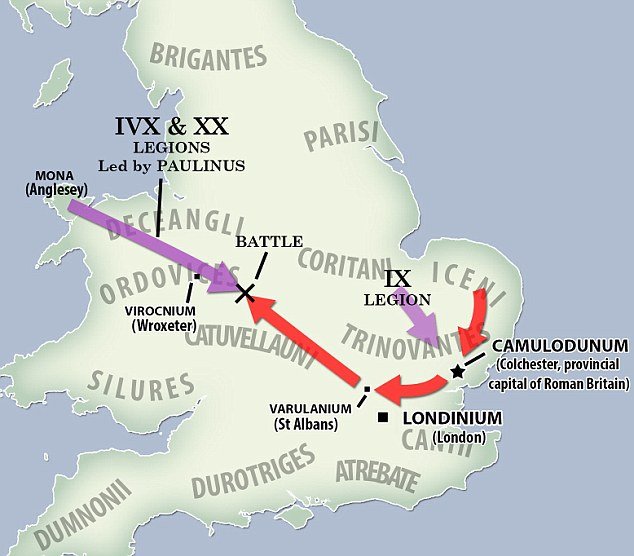
However, the 2nd Legion did not come: Poenius Postumus refused to follow the order of Suetonius and - spooked by the news of the rebellion - considered it madness to obey orders, so he stayed with his men on the south-west costal town - probably not out of cowardice, but simply because he thought the matter needed to be dealt with much bigger reinforcements from the continent (a decision which would lead to his suicide after the subsequent defeat of Boudicca).
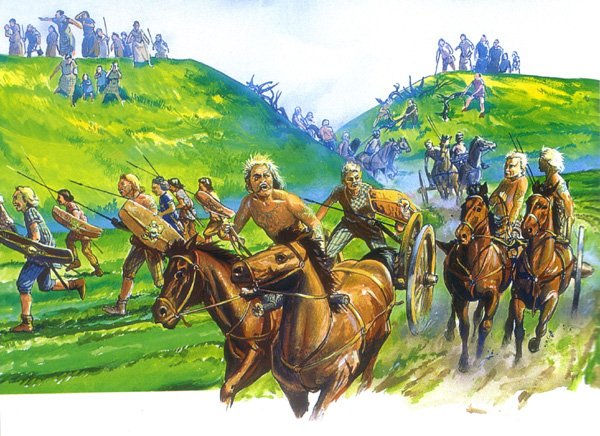
Furious, Suetonius gathered all the forces he could from the surroundings at hand and that amounted, according to Tacitus to…
the fourteenth legion, with a detachment of the twentieth and auxiliaries from the nearest stations, altogether some ten thousand armed men
10 000 men was not a bad number, but considering Boudicca’s army was supposed to be at least 10 times larger than that, Suetonius knew that his only chance would be to impose the Romans ways of war to the Barbarians.
The Horde is Coming
Boudicca was hard-pressed as well by the circumstances: she needed to end all this business quickly before any reinforcement could come from the continent. In spite of all the looting, her army was also probably short on supply, and being a not professional army, many among her followers probably lost the big picture and were probably tempted to desert with their share of the spoils.
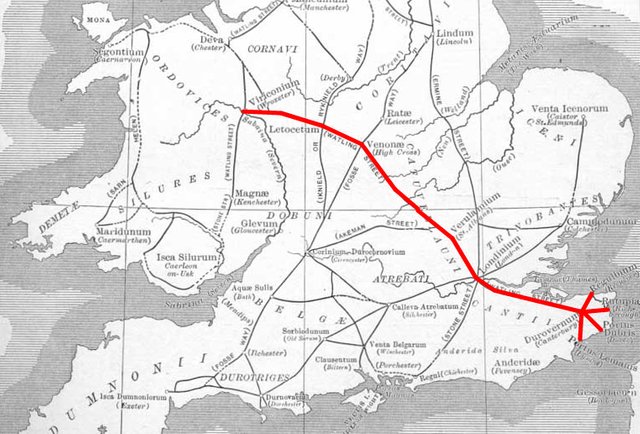
[Source]
So, the great army of Boudicca left the smouldering ruins of Saint Albans behind them and crept along Watling Street, the Roman road leading from Dover in the south as far as the border with Wales, to try to catch up with the remnants of Suetonius and force them into a battle where their numerical superiority would just annihilate them.
The battle of Watling Street
The careful Suetonius eventually decided to stand his ground on an unknown location of the Watling Street, and face the onslaught of the Britons. He had chosen the place carefully:
He chose a position approached by a narrow defile and secured in the rear by a wood, first satisfying himself that there was no trace of an enemy except in his front, and that the plain there was devoid of cover and allowed no suspicion of an ambuscade.

[Source]
There, he waited for Boudicca’s army approach and spoke to his soldiers, reminding them, according Tacitus, that...
They must treat with contempt the noise and empty menaces of the barbarians: in the ranks opposite, more women than soldiers meet the eye. Unwarlike and unarmed, they would break immediately, when, taught by so many defeats, they recognized once more the steel and the valour of their conquerors.
In the opposite side, Boudicca probably didn’t need much words to inspire his warriors whose confidence was running high following that ininterrupted streak of victories, but Tacitus can’t help retelling the speech she is supposed to have made to her troops, mounted on a chariot with her daughters:
Roman cupidity had progressed so far that not their very persons, not age itself, nor maidenhood, were left unpolluted. Yet Heaven was on the side of their just revenge: one legion, which ventured battle, had perished; the rest were skulking in their camps, or looking around them for a way of escape. They would never face even the din and roar of those many thousands, far less their onslaught and their swords!

After those words, the battle started. The Romans stood their ground and let the Britons advance and discharge a rain of arrows and spears upon them, but the natural defile behind which the Romans were positioned and their armours prevented them from getting any trouble from this attempt.
As soon as the rain of missiles was exhausted, Suetonius gave his men the order to advance:
they dashed forward in a wedge-like formation. The auxiliaries charged in the same style; and the cavalry, with lances extended, broke a way through any parties of resolute men whom they encountered.
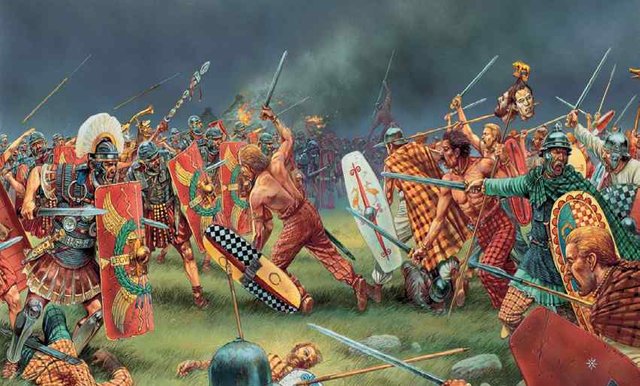
[Source]
The over-confident Britons were probably astonished by the determination and professionalism of the battle-hardened legionaries coming at them - after weeks of victories, they probably expected the Romans to lay down their arms at the first encounter. But it’s the contrary that happened: in a matter of hours, their ranks were broken, pushed back, and confusion and chaos quickly followed because of their baggage train:
The remainder took to flight, although escape was difficult, as the cordon of waggons had blocked the outlets. The troops gave no quarter even to the women: the baggage animals themselves had been speared and added to the pile of bodies.
As incredible as it is, the battle of Watling Street was all it took to ruin the grand plans of Boudicca: the remnants of her huge army dispersed, and her own fate remains unknown, adding to her legend, but the sources say that she escaped from the wreck of the battlefield and probably to evade capture, she took poison with her daughters.
Aftermath
Whatever the true numbers of the defeat suffered by the Britons at Watling Street, the defeat was complete for Boudicca’s rebellion, as recall Tacitus:
by some accounts, little less than eighty thousand Britons fell, at a cost of some four hundred Romans killed and a not much greater number of wounded.
However, some of the warriors still managed to escape and, in one way or another, would try to keep up the fight as long as possible in the countryside - hampered however by their own scorched-earth policy:
Nothing, however, pressed so hard as famine on an enemy who, careless about the sowing of his crops, had diverted all ages of the population to military purposes, while marking out our supplies for his own property.
The news of the rebellion eventually reached Rome, where the Emperor Nero ordered reinforcements at last to be sent to the island from Germany, essentially to reform the IXth Legion.
Its strength was increased by the Caesar, who sent over from Germany two thousand legionaries, eight cohorts of auxiliaries, and a thousand cavalry.
However, it must have been clear to the higher echelons in Rome that the rebellion was not as unpredictable as Suetonius probably tried to present it: Catus Decianus was replaced as procurator by Julius Classicianus, who clearly saw Suetonius as the main culprit and his greed and high-handedness as the motive behind the rebellion, going as far as to circulate...
a report that it would be well to wait for a new legate; who, lacking the bitterness of an enemy and the arrogance of a conqueror, would show consideration to those who surrendered. At the same time, he reported to Rome that no cessation of fighting need be expected until the supersession of Suetonius, the failures of whom he referred to his own perversity, his successes to the kindness of fortune.
Eventually, Suetonius would be recalled under a false pretence at the first opportunity, while the embers of the rebellion were still hot and glowing. However, in the absence of a figure like Boudicca, there would be no more rebellion on such a scale of what happened in 61AD. There is no way to know if the tribes won something from the rebellion, even a kind of grudging respect from the Romans, but London was rebuilt, the surviving locals were submitted and slowly but surely integrated into the Roman system.
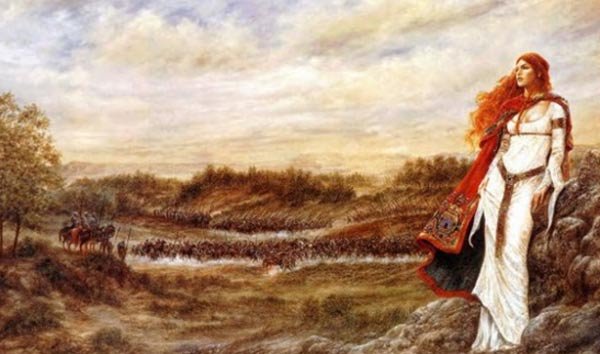
[Source]
Rome was to stay in Britain, at least for the 4 following centuries, loyal, prosperous and tamed - but not without having given to its master a good fright similar to what Arminius and Vercingetorix did for Gaul and Germania.
THE ENDPrevious episodes:
ENEMIES OF ROME 7.1 - BOUDICCA - The Warrior Queen
ENEMIES OF ROME 7.2 - BOUDICCA - Outrage
ENEMIES OF ROME 7.3 - BOUDICCA - Hares & Foxes vs. Dogs & Wolves
Sources:
http://penelope.uchicago.edu/~grout/encyclopaedia_romana/britannia/romanbritain.html
http://penelope.uchicago.edu/Thayer/e/roman/texts/tacitus/annals/14b*.html
http://penelope.uchicago.edu/Thayer/e/roman/texts/cassius_dio/home.html>
http://penelope.uchicago.edu/Thayer/E/Roman/Texts/Cassius_Dio/62*.html https://en.wikipedia.org/wiki/Fosse_Way
it s a great art and i liked it